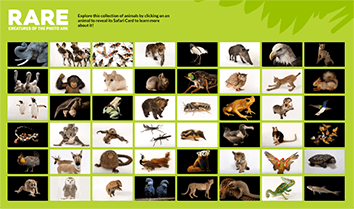Including: Safari Slideshow & Creature Cards
Explore NowJoel’s Tips for How You Can Help
You don’t need to be a renowned National Geographic photographer to make an impact on at-risk and endangered species. Taking care of the planet we live in so that species can continue to thrive can start in your own backyard.
Want to know how? Scroll down to see tips from Joel for how to get involved and make a difference.
Check out additional resources and suggestions on Joel’s website and on the Photo Ark site.
Snap a Pic in Your Backyard!
Be me for the day! Find a creature in your backyard, a neighborhood park, or a local zoo and take its photo (without disturbing it, of course). Post that photo to Instagram or Twitter using the hashtag #RarePBS to show your support for conservation.
Not sure how to get started? Read my photography tips »
Here are some of my favorites that you posted:
Be Pollinator-Friendly
Plant a pollinator garden to save bees and butterflies, and practice all-natural lawn care by quitting pesticides, herbicides, and fertilizers, as they are poisonous to our friendly pollinating insects. Planting nectar-bearing plants in addition to milkweed will encourage monarch butterflies to stop in and lay their eggs. Be sure to plant what’s native to your part of the country. By combining a pollinator garden with organic lawn practices, your lawn is sure to be a safe haven for pollinators like butterflies and bees.
Reduce, Reuse, Recycle
Reduce, reuse and recycle what you buy. Recycling is the last resort, because it takes a lot of energy to break down and reform materials. Better to buy less and reuse it more! It’s very important to purchase secondhand clothing as well, as the fashion industry is the second-dirtiest (right behind big oil). Shop at your local thrift stores or on online sites for secondhand clothing. Being sustainable is fashionable!
Support Zoos
Support your local zoo, aquarium or wildlife rehab center: they work tireless to save wildlife 365 days a year. Many species only exist in captivity now. My work has me traveling to zoos throughout the country and the world, and I’ve seen firsthand how supporting a local accredited zoo provides direct financial support for breeding and saving rare animals.
Quit Plastic
Say no to to single-use plastic items such as plastic grocery bags, single-serve coffee pods, and disposable straws and lids at coffee shops. Plastic never completely biodegrades, and is disruptive especially to marine wildlife. Use reusable grocery bags, and bring your own cup if you know you will be purchasing a beverage. I’ve found that many coffee shops even offer a discount when you bring your own to-go mug.
Eat Mindfully
Eat less meat, and eat locally whenever possible. Meat takes a lot of energy, grain and water to produce. Try limiting your meat intake to one meal per day, or only a few meals per week. Buying locally-produced fruits and veggies supports local farmers, and doesn’t require the carbon emissions of a diesel truck driving it to you from across the country. The food I buy this way is more likely to be organic and better tasting as well, so make the choice that is better for your body and the earth.
Be a Smart Consumer
Read food labels, and don’t purchase products containing palm oil. Palm oil is in as much as 50% of all foods on supermarket shelves, and when unethically sourced, contributes to deforestation and habitat loss.
Know Your Fish
Are you a fan of sushi? Most seafood is not fished or farmed in a way that is healthy for the oceans or population numbers. I try to do research online before going grocery shopping or dining out to know where my fish is coming from.
Drive Green
Drive a smaller car, and drive it less. It’s time to rethink driving around in an SUV or a pickup by yourself. Even if gas is cheap, putting more carbon in the air than you really need is costly to the environment. Buying a used car is also ideal, as the energy-intensive manufacturing process of a new car contributes up to 28% of the total environmental impact of the vehicle. Keep the earth and your wallet in mind by buying a smaller used car, and carpooling whenever possible.
Support Sustainable Energy
Insist that your local authorities purchase sustainable energy. Don’t wait until the Earth has been made hot and miserable from fossil fuels. Do this now! Make sure to stay informed and up to date on what is happening environmentally. Do you know what laws are in question? What can you be voting on? Make your voice heard.
Recycle Small Electronic Devices
Recycle, re-sell, or trade in your cell phones or small electronic devices. Tantalum, a material used in our cell phones, is mined from areas in Africa that are within the home range of many endangered primates. By recycling these electronics, the tantalum can be reused, reducing the need to mine in these habitats.
Read Labels
Read the labels of your self-care products. Many products contain microbeads, small plastic exfoliants, that once washed down the sink, are released into the waterways where they bioaccumulate in marine wildlife. Ban these sneaky plastics and opt for natural alternatives to your normal beauty products by reading labels carefully.
Say Goodbye to Junk Mail
Cut down on paper waste by unsubscribing from junk mail, and purchasing toilet paper made from recycled paper in order to reduce the amount of new trees that must be processed. Declutter your desk, and help the forests at the same time.
Beware of Greenwashing
Greenwashing is when a company recognizes the need to be environmentally-friendly, but rather than making any real changes, they disguise their product using “environmental” keywords to give purchasers some comfort. Words like “all-natural” and “pure” don’t necessarily mean anything, so always be sure to read labels and think for yourself!
Insulate Your Home
This will save conditioned air from escaping, reduce your carbon footprint, and put money in your wallet in the long run. Get in the habit of putting on a sweater or taking off layers as well before you reach for the thermostat.
Put Your Money Where Your Mouth Is
Think about each and every dollar you spend. You are in effect ‘voting’ every time you break out your purse or your wallet, telling retailers you want their products again and again. Are the things you buy good for the planet or harmful to it? How you spend your money can literally move mountains, so be sure you are voting in a way that is sustainable for your future!
Unplug Your Cords
Even if your hair dryer isn’t on, leaving it plugged in sucks energy from the source and wastes it. Kill energy vampires by unplugging devices while not in use.



